Carmakers are holding back sales of both electric cars and more fuel-efficient upgrades of their bestselling models in Europe, according to a new report by the green transport group Transport & Environment.
Only six of the top 50 selling models in Europe received a full model upgrade in 2017 and very few new plug-in cars were made available – contributing to the lack of progress in reducing car CO2 emissions last year.
Just four of the top-selling 50 models are set to be fully upgraded by the end of this year, followed by 14 in 2019, and seven in 2020. T&E said that seven upgrades per year is typical for the top 50 selling models.
“Carmakers are shameless, crying wolf that they can’t meet their CO2 targets and blaming declining diesel sales, while pushing old, inefficient, high-performance SUVs to maximise their profits,” said Greg Archer, clean vehicles director at T&E. “As a result, CO2 emissions are rising and their customers are hit with higher fuel bills. But the reality is almost all serious carmakers in Europe will hit their targets and avoid fines.”
According to the T&E report, manufacturers’ strategy to comply with the 2021 targets is to increase sales of battery electric and plug-in hybrid vehicles. This could increase their market share in Europe significantly to 5-7% by 2021. However, the analysis shows carmakers are also holding back the launch of new plug-in vehicles until the last possible moment.
Currently, there are only 20 battery electric cars on sale at present. By 2021, there could be more than 100.
“Carmakers are desperately trying to persuade regulators to drop the planned 2025 car and van CO2 targets completely and set even easier 2030 goals,” said Archer. “The plan is to keep selling diesels in Europe for as long as possible. Politicians should not be fooled by their cynical strategy and must instead demand ambitious 2025 targets, a mandate for electric vehicle sales as well as guarantees that emission reductions happen in the real world and not just in carmaker labs.”

